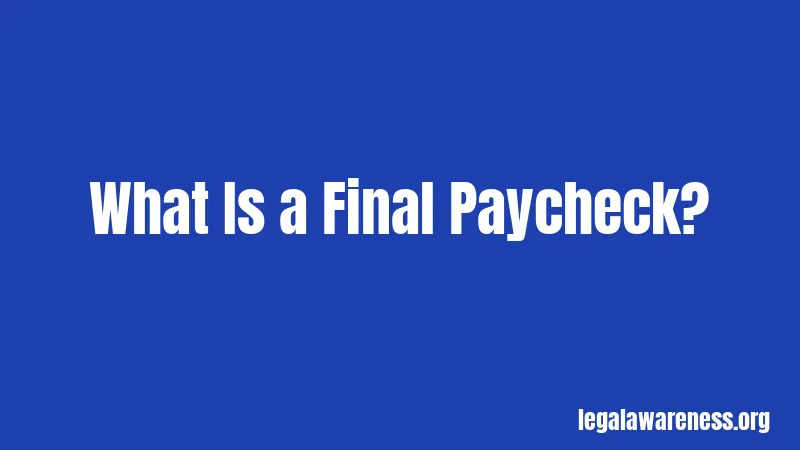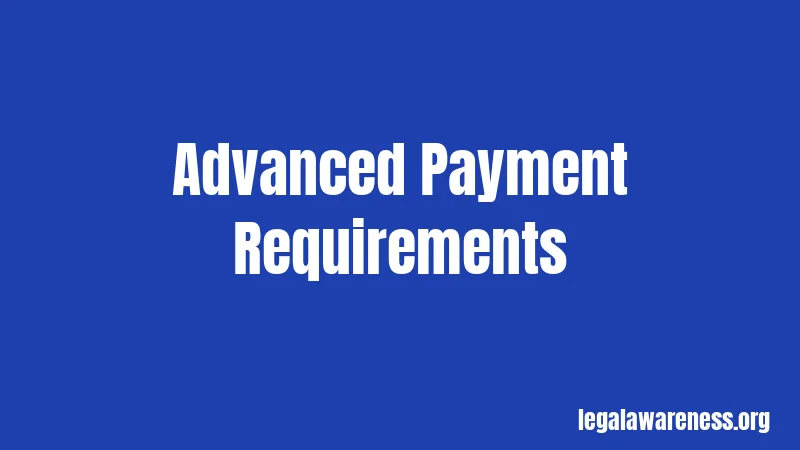Last Paycheck Laws in Pennsylvania (2026): Everything You Need to Know
Pennsylvania has strict rules about when employers must pay final paychecks. These laws protect workers when they quit or get fired. Understanding these rules helps both employees and employers avoid costly mistakes.
This guide covers Pennsylvania’s final paycheck laws, penalties, and what to do if your employer doesn’t follow the rules.
What Is a Final Paycheck?

A final paycheck is the last payment an employee gets when leaving a job. This happens when someone quits, gets fired, or is laid off. The final paycheck must include all wages the worker has earned.
Pennsylvania law calls this the “Wage Payment and Collection Law.” This law makes sure workers get paid for all the work they did. It covers regular wages, overtime, commissions, and bonuses that were already earned.
Basic Final Paycheck Laws
When Must Employers Pay Final Wages
Pennsylvania requires employers to pay final wages by the next regular payday. This rule applies whether the employee quit or was fired. There is no difference in timing between voluntary and involuntary termination.
For example, if someone gets fired on a Wednesday and the normal payday is Friday, the employer must pay by Friday. If someone quits on Monday and payday is the following Friday, payment is due by that Friday.
What Must Be Included
The final paycheck must contain several types of pay. Regular wages from the last pay period must be included. Earned overtime pay must also be included if the employee worked extra hours.
Commissions that were already earned must be paid. Bonuses that the employee has earned must be included too. Any accrued vacation pay may need to be included if company policy promises payment for unused vacation time.
Advanced Payment Requirements

Delivery Methods
Pennsylvania law does not specify how final paychecks must be delivered. Employers can use direct deposit if the employee previously agreed to it. They can also pay by regular check or payroll card.
The paycheck can be given in person or mailed to the employee. If the employee asks for the check to be mailed, the employer must do this. The employer must use certified mail if the employee requests it.
Written Authorization for Deductions
Employers can only take money from final paychecks in specific situations. Legal deductions like taxes and Social Security are always allowed. Other deductions need the employee’s written permission.
The deduction must be “for the convenience of the employee.” This usually means things like health insurance premiums or retirement contributions. Taking money for damaged or missing company property is much more complicated and risky.
Penalties and Consequences
Liquidated Damages
Pennsylvania law includes strong penalties for employers who don’t pay on time. If wages remain unpaid for 30 days after the regular payday, employees can get liquidated damages. This means an extra 25% of the unpaid wages or $500, whichever is more.
For example, if someone is owed $2,000 in final wages, they could get an extra $500 in liquidated damages. If they’re owed $200, they would get the minimum $500 penalty.
Attorney Fees and Interest
Employees who win wage cases can also recover their attorney fees. This means the employer pays the worker’s legal costs. Courts can also award prejudgment interest on unpaid wages.
These penalties can add up quickly. A $1,000 unpaid paycheck could cost the employer $1,000 plus $500 in liquidated damages plus attorney fees plus interest.
Criminal Penalties
In serious cases, willfully withholding wages can be a criminal offense. Employers who repeatedly violate wage laws face higher penalties. The Pennsylvania Department of Labor can impose additional fines and penalties.
Special Circumstances

Company Property Issues
Many employers want to hold final paychecks until employees return company property. Pennsylvania law does not allow this. Employers cannot use the final paycheck as leverage to get property back.
Even if the employee owes the company money for lost or damaged property, the employer generally cannot withhold the paycheck. This creates problems for employers but the law is clear about protecting wages.
Good Faith Disputes
If there is a genuine dispute about how much is owed, employers may have some protection. The dispute must be in good faith and about a real disagreement. Simply claiming there’s a dispute won’t protect an employer from penalties.
The employer must be able to explain why they believe they don’t owe the full amount. Vague claims or obvious delays won’t qualify as good faith disputes.
Vacation and PTO Policies
Pennsylvania law does not require employers to pay for unused vacation time. However, if the company policy or employee handbook promises payment, then it must be included in the final paycheck.
Employers should have clear written policies about vacation payouts. These policies should explain when unused time will and won’t be paid.
How to File a Wage Complaint
State Complaints
Workers can file complaints with the Pennsylvania Department of Labor & Industry. The Bureau of Labor Law Compliance handles these cases. Complaints can be filed online or by mail.
The complaint must be filed within three years of when the wages were due. Workers need to provide information about their employer, how much they’re owed, and when payment was supposed to happen.
Required Information
When filing a complaint, workers need specific information. They need the employer’s name and address. They need to know exactly how much money they’re owed and when it should have been paid.
Pay stubs, employment contracts, and company handbooks can help support the complaint. Any written communications about the unpaid wages are also helpful.
Contact Information
The Pennsylvania Department of Labor can be reached several ways:
Online: File complaints at pa.gov/services/dli/file-a-wage-payment-and-collection-complaint
Phone: Call (800) 932-0665
Mail: Bureau of Labor Law Compliance, 1301 Labor and Industry Building, 651 Boas Street, Harrisburg, PA 17121
Email: [email protected]
Philadelphia Special Rules
Philadelphia has additional wage theft protections beyond state law. Workers in Philadelphia can file complaints with the city’s Department of Labor. These complaints must be filed within three years and involve more than $100 in stolen wages.
Philadelphia workers can email [email protected] or call (215) 686-0802. The city has its own investigation process and penalties for employers who violate wage laws.
Frequently Asked Questions
How long does my employer have to pay my final check?
Your employer must pay your final wages by the next regular payday. This applies whether you quit or were fired.
Can my employer hold my paycheck if I don’t return company property?
No. Pennsylvania law does not allow employers to hold final paychecks as leverage to get property back.
What if there’s a dispute about how much I’m owed?
Employers can only withhold payment if there’s a genuine, good faith dispute about the amount owed. They must be able to explain their reasoning.
Can I get extra money if my employer pays late?
Yes. If your wages remain unpaid for 30 days, you may be entitled to liquidated damages of 25% of unpaid wages or $500, whichever is more.
Do I get paid for unused vacation time?
Only if your company policy or handbook promises payment for unused vacation. Pennsylvania law doesn’t require vacation payouts.
How long do I have to file a complaint?
You have three years from when the wages were due to file a complaint with the state. Some local jurisdictions may have different time limits.
Can my employer deduct money from my final paycheck?
Only with your written permission and only for deductions that are “for your convenience.” Legal deductions like taxes are always allowed.
What happens if I win my case?
You can recover your unpaid wages plus liquidated damages, attorney fees, and interest. This can significantly increase the total amount.
Final Thoughts
Pennsylvania’s wage payment laws strongly favor employees. The penalties for employers who don’t follow these rules can be severe and expensive. Workers who don’t receive their final paychecks on time have powerful legal tools to recover what they’re owed.
If you’re an employee waiting for a final paycheck, don’t wait too long to take action. Contact the Pennsylvania Department of Labor or speak with an employment attorney about your rights.
If you’re an employer, make sure you understand these rules and have good systems in place for processing final paychecks quickly and accurately.
References
- Pennsylvania Wage Payment and Collection Law (43 Pa. Cons. Stat. Ann. § 260.1 et seq.)
- Pennsylvania Department of Labor & Industry – Wage Payment Information
- File a Wage Payment and Collection Complaint – Commonwealth of Pennsylvania
- Pennsylvania Labor Law Compliance Bureau
- Philadelphia Wage Theft Complaint Information
